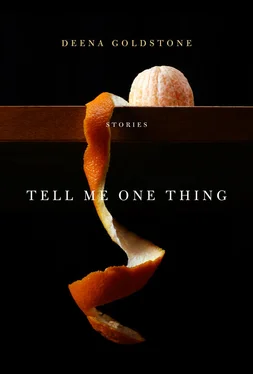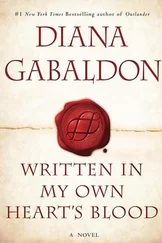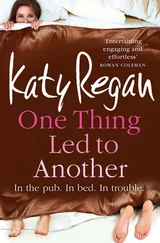She sees a broad, open face and thick, straight black hair cut short. Hispanic, Latino, she’s not sure which is the proper term these days. But it’s his eyes that hold her — they’re full of concern.
“I was sorry to hear about Mr. Brian. I haven’t seen you before to tell you.”
“You speak perfect English.”
He shrugs — it’s not quite true, he worries about his English still — and she wonders if she offended him. “Were you born here?”
“No, Mexico. I came when I was thirteen.”
Trudy looks at the garage wall, the sweet pea seedlings in the rich, brown dirt. “Brian always …” she starts and then can’t continue.
“I thought I would plant the sweet peas this year,” Armando says to her. “I thought, maybe, you’d want to see them cover the wall.”
“Yes,” she tells him. She realizes she wants very much to see the sweet peas blooming.
“I would have used netting, you know, plastic netting across the wall,” Armando tells her, comfortable, it now seems, with a lengthy conversation, “but Mr. Brian always liked to stretch the strings. It takes more time, but it’s the way he would have done it.” Another shrug. “I thought — he can’t do it, I’ll do it his way.”
All she can manage is a “thank you” even as it catches in the back of her throat. She has to get back to the house. She can’t have this conversation. She can’t discuss Brian with this young man.
Armando watches her walk across the yard. How does a woman live with so much pain? is what he thinks.
• • •
SPRING ARRIVES IN FEBRUARY. When Brian used to tell his mother back in Ohio that bulbs begin to push up in February, that roses break out with their first red leaves, that fruit trees blossom white and pink popcorn in February, she refused to believe it. While the rest of the country is miserable in winter, Southern California sashays its way right into spring.
Across the backyard and the front planting beds daffodils, anemones, ranunculus, and narcissus seem to appear overnight where there was nothing but empty space. By March, the sweet peas are halfway up the garage wall. Trudy gets up every morning, puts on Brian’s windbreaker, holds her hands around his curved gloves, and walks the four blocks to the library. Nothing’s changed. All around her the natural world screams renewal, but she doesn’t notice it.
The only thing she looks forward to is her Friday afternoon turn as the Story Lady. She gets to pretend on top of the pretense of her whole life now. It’s the highlight of the week for Trudy and for many of the exhausted mothers of Sierra Villa who have preschool children and crave an hour off.
By three o’clock the library has filled up with children aged two to six. Usually once the kids hit seven, they won’t be caught dead listening to the Story Lady.
Trudy makes a production out of it. The costume she found at the Rose Bowl Flea Market. It must have been made for some movie, she thinks, because it’s intricately embroidered with silver thread, and fake pearls, and yards of flowing chiffon. The tiara Trudy wears she found at Walgreens, but the cachet of the dress extends to the insubstantial crown and makes it look like the real thing.
All the children are seated on one of the tiny chairs or big, floppy pillows arranged around a brightly painted big chair that Brian created for the Story Lady one Sunday. It almost looks like a throne, but right now it is empty, waiting for the children to settle so that Trudy can make her big entrance.
Clemmie manages to hush the last few whispers and then announces to the audience, “And now, straight from Fairy Tale Lane, our own Story Lady!” And she turns with a flourish and a sweep of her hand in the direction of the library’s bathroom — where else could Trudy transform herself? — and there are “ooh’s” and “aah’s” as Trudy floats in her floor-length gown and diamond tiara to the reading circle.
“Today,” Trudy tells the children, who gaze up at her with expectant faces, “I’m going to read you a story called Wylie Makes a Wish.”
The mothers, sitting at the wooden tables in back of the story circle, lean back, take out their cell phones or iPads, make grocery lists, sip their Starbucks. All heave a sigh — a free hour while Trudy works her magic.
“ ‘Wylie wanted many things. He wanted a baseball mitt and chocolate-chip cookies for breakfast and swimming lessons in the summer. But most of all, he wanted a grandpa.’ ” Trudy turns the book toward the children so they can see the picture of Wylie. He’s about five and has freckles and a thatch of red hair across his forehead. Above his head spin pictures of a glove, the cookies, and an outdoor pool.
“Sometimes my mommy lets me eat cookies for breakfast,” pipes up one four-year-old with a mass of tiny black ringlets haloing her face, and a woman with the identical hair slides down in her undersize chair, her face blooming beet red. “Once,” she murmurs, “I let her once.” Clemmie, patrolling the perimeter of the reading circle, pats the woman on the shoulder.
“ ‘Wylie had two grandmas,’ ” Trudy continues. “ ‘One he called Nana and the other he called Toots because she didn’t think she was old enough to be a grandma, and they were both very nice. But they weren’t grandpas. It wasn’t the same. Not at all!’ ”
The next picture shows a very stubborn Wylie with his arms crossed against his chest and his jaw set with indignation.
“ ‘ “Why don’t you make a wish for one?” his mother said as a last resort since no amount of reasoning seemed to make a difference. “Yes!” Wylie yelled. “That will do the trick!” And so that night when his father was putting him to bed and he saw the first shining star, Wylie wished for a grandpa.’ ”
Now Trudy rests her forearms on her knees and turns the book so the children can see Wylie wishing on his star. “ ‘Wylie believed that wishes come true …’ ”
Trudy pauses for a fraction of a second —if only is what she hears romping through her brain — and then continues. “ ‘… and that because he wanted a grandpa more than anything, he would get one.’ ”
“That’s right,” says a very serious child, nodding as he speaks. “If you wish hard enough, you get it.”
Fat chance! Trudy wants to scream but, of course, she doesn’t. She starts the next page. “ ‘Wylie worked very hard at his wishing,’ ” only now tears are falling from Trudy’s eyes, straight from her eyes into her lap. She doesn’t seem to know that this is happening. The little boy with the serious eyes sitting near her puts a hand on Trudy’s leg in comfort.
“ ‘And he kept opening the front door to see if a grandpa had arrived,’ ” Trudy manages to get out, though her voice is trembling. “ ‘But the front step was always empty. No one was there.’ ”
And Trudy puts the book down on her lap, her face in her hands, and begins to sob. Huge, breath-shattering sobs that thunder from her clenched body as if propelled by an avalanche — an avalanche of grief.
The mothers stir, sit up straighter, punch off their cell phones. What’s happening here? They weren’t really paying attention. But some of their children are crying now as well. This is a disaster runs through Clemmie’s mind as she moves to stand in front of Trudy.
“The Story Lady …” she begins to explain, but Trudy stands up, hiccuping now with more sobs, and rushes out of the library, through the glass front doors and out onto the street. The children watch her with open mouths of astonishment.
Trudy is mortified, terrified. What is happening to me? is the only coherent thought she’s able to manage before the sobbing picks up again, another round of anguished sounds escape from her throat as she runs down La Cruza Street, desperate to get away from the scene of her humiliation. She gasps for breath as she runs. Maybe she’s having a heart attack. Maybe’s she dying. She runs anyway.
Читать дальше












